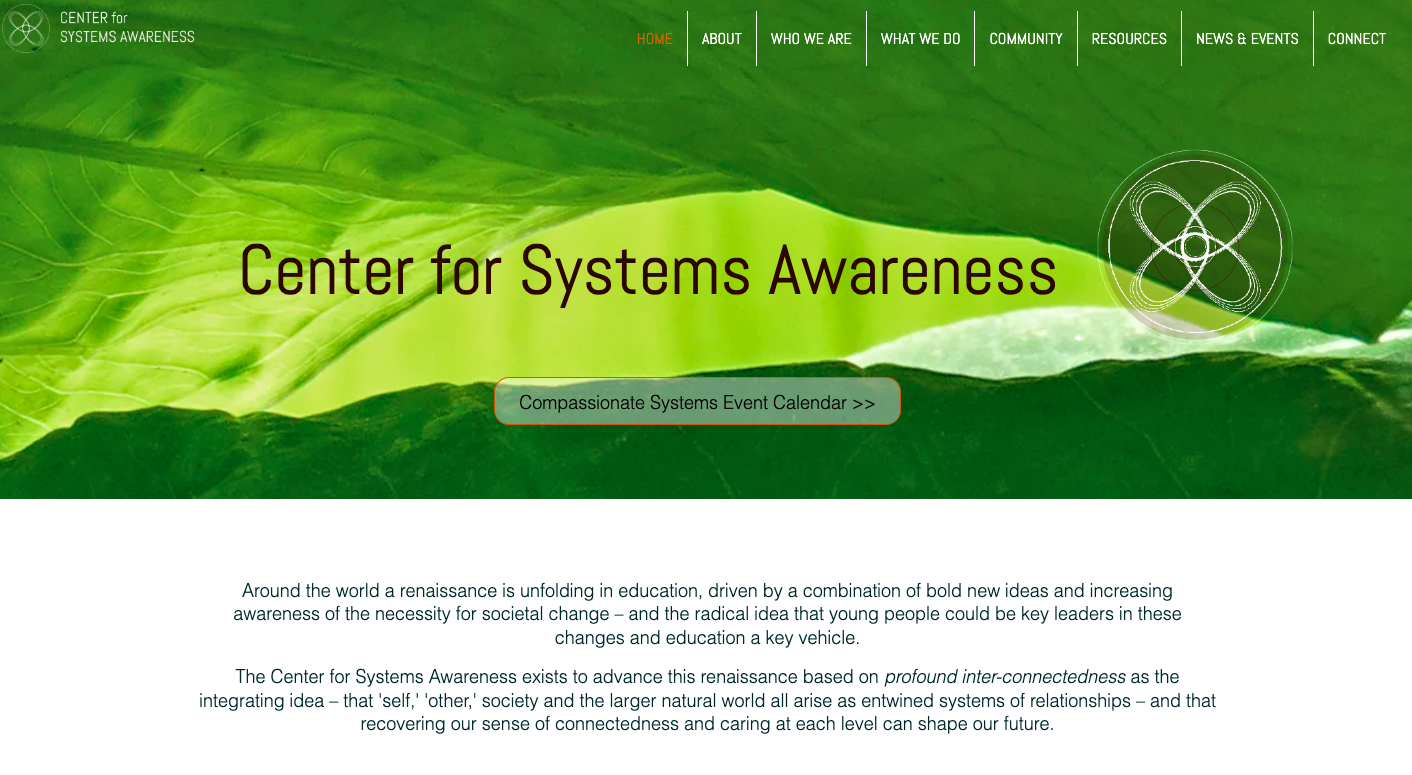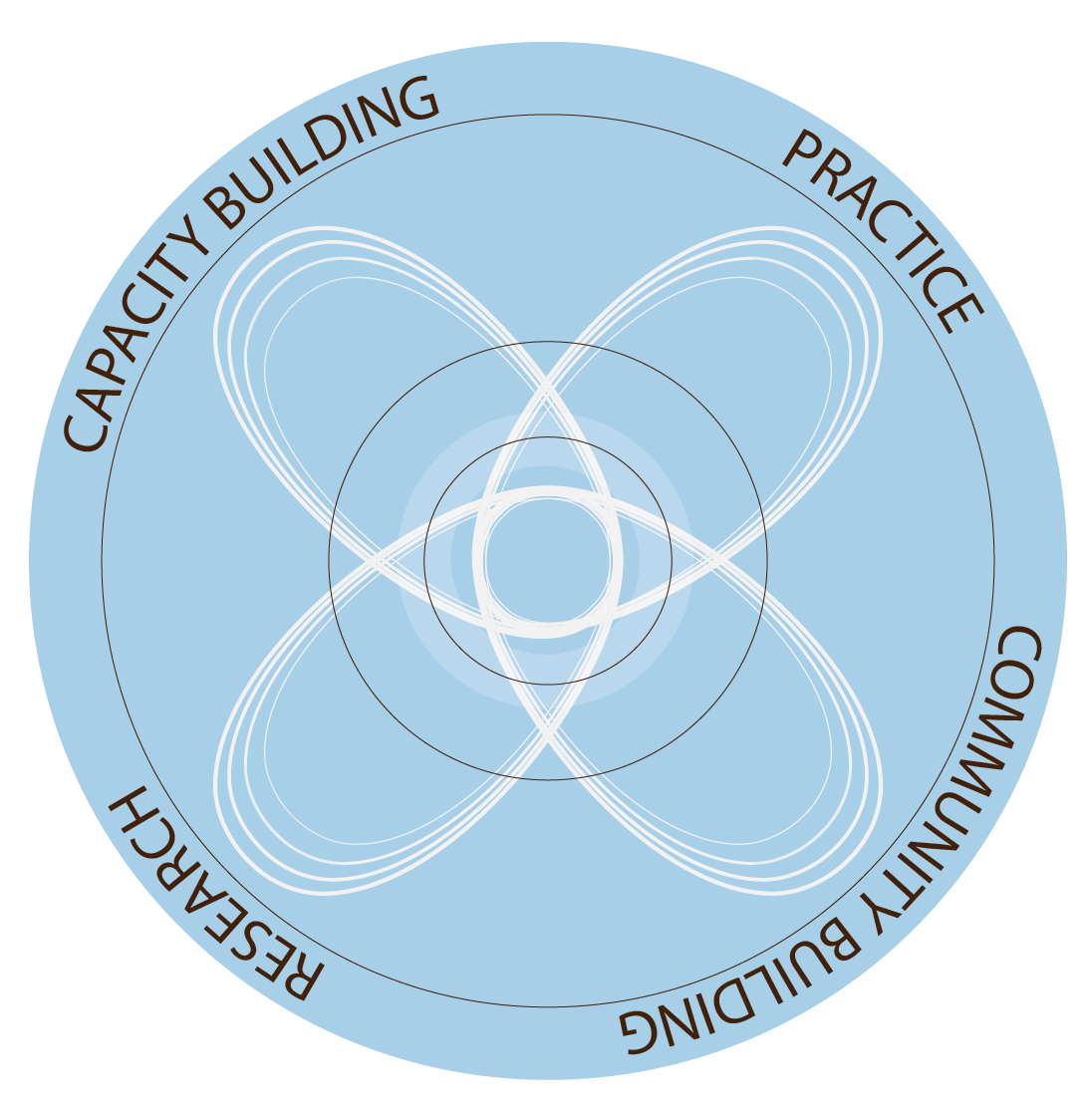Center for Systems Awareness
- North Andover, Massachusetts, USA
- Education & Training,
- Consulting & Advisory,
- Research,
- Convening & Coordination
- Education & Learning
1997
11-20

Organization information
The Center for Systems Awareness honors the mind-heart-body system of the learner, the social reality of relationships, family and community that is the context for all learning, and responds to the need to engage learners of all ages in fostering systemic well-being at all levels, from the individual to the larger systems of institutions, society, economy and ecology.
We support and connect local communities in diverse settings developing a 'compassionate systems' approach to education that connects capacity building and community building to research and practice. This larger budding global community of compassionate systems practitioners, in turn, is part of a wider effort to come to a deeper understanding of the subtle aspects of systems awareness needed for sustaining deep change over time.
About', https://systemsawareness.org/about/
Mission
Around the world a renaissance is unfolding in education, driven by a combination of bold new ideas and increasing awareness of the necessity for societal change – and the radical idea that young people could be key leaders in these changes and education a key vehicle.
The Center for Systems Awareness exists to advance this renaissance based on profound inter-connectedness as the integrating idea – that 'self,' 'other,' society and the larger natural world all arise as entwined systems of relationships – and that recovering our sense of connectedness and caring at each level can shape our future.
History
The Center for Systems Awareness grew out of the former Society for Organizational Learning (SoL), an independent non-profit organization founded in 1997, which itself grew out of the MIT Center for Organizational Learning originally founded in 1990.
'Our History', https://systemsawareness.org/about/#mandala-for-systems-change
What they do
- Their main focus is on education and capacity-building
- They run workshops and courses, e.g. introductions to their Compassionate Systems Framework and Advanced workshops for deeper systems awareness and systems change skills
- They do research into systems awareness work in multiple settings, e.g. investigating the implementation of the Compassionate Systems Framework in schools
- They run a number of projects which put their capacity-building frameworks into practice
Read more: https://systemsawareness.org/what-we-do/
Key Educational Resources
They have lots of good 'Resources for Systems Awareness' listed on this page: https://systemsawareness.org/resources/#suggestedreadings. Here are a few:
- 'What do We Mean by Systems Change and Why is it So Difficult in Education?' (video), https://systemsawareness.org/what-do-we-mean-by-systems-change-and-why-is-it-so-difficult-in-education/
- The Fifth Discipline (1990, 2007) by Peter Senge (book). Listed under suggested readings for 'Basics of Organizational Learning'
- The Systems Thinker website , website containing hundreds of short articles and other tools
Connections
Some of the thinkers listed in their Suggested Readings list include:
- Thich Nhat Hanh
- Donella Meadows
- Gregory Bateson
- adrienne maree brown
- Otto Scharmer
- Jon Kabat-Zinn
- Ibram X. Kendi
- Paul Hawken
- Lisa Lahey
- Robert Kegan
Theory of Change
Cultivating awareness of wholeness, connectedness, and interdependence is crucial to deep change
Throughout the history of our work, we have seen cultivating awareness as crucial to deep change. All systems operate the way they do because of how we work – how we think, act, and inter-relate. Many of us, most of the time, operate within an illusion of separateness, what Albert Einstein called “a kind of optical delusion of consciousness.” When we see problems in the world, we see them as separate from ourselves. When we seek to bring about change, we see that which we are trying to change as separate from those of us trying to create the change. When we seek to lead, we see ourselves as leaders separate from those being led. An important mentor David Bohm, himself a protégée of Einstein’s, said all our problems start with 'fragmentation.' Unable to see the whole of things, we try to fix pieces – like trying to "re-assemble the fragments of a shattered mirror" in Bohm’s words – and, in so doing, often make matters worse.
('Our Purpose', https://systemsawareness.org/about/#our-purpose)
Cultivation of the awareness we need must take place in the midst of engagement with real-world, current problems
This is no time for monastic retreat but a new monastic order. In Margaret Wheatley’s words, we seek “warriors of the heart” who are equally engaged in the world and in their own cultivation – as two facets of the same journey.
('Our Purpose', https://systemsawareness.org/about/#our-purpose)
Focus on education because of its unique potential to perpetuate or shift culture
The Center for Systems Awareness focuses today on education because, in a sense, all our major challenges today are “educational” in the broadest sense. In particular, we focus on work with schools and with organizations that work with children and young people outside school. This idea of “school” writ large is crucial because school is the only major institution with a fifty-plus year time horizon - that is, a time horizon commensurate with the deep changes our societies face. This is also because systems thinking is often easier for children and young people who are closer to the innate systems awareness that we all possess but which tends to atrophy as we get older if not cultivated. We are not seeking to ‘fix” education, but honor it as a core “upstream” institution with unique potential to either perpetuate or shift the Industrial Age DNA of separation and exploitation that shapes all modern societies.
('Our Purpose', https://systemsawareness.org/about/#our-purpose)
Language
- They use the term "renaissance" on their website to describe bold change currently happening in education, e.g. see Mission
- In the 'Lexicon' section at the bottom of their 'About' page, they define some of the key terms that ground their theory and practice, such as:
- Systems Awareness
- Emotions and Feelings
- Empathy and Compassion
- Compassionate Integrity
- Complexity and Systems
- Systems Change
- Social Fields & Generative Social Fields
- Well-Being
Mandala for Systems Change
The Mandala for Systems Change is a framework developed by the Center for Systems Awareness which guides all their projects for change. It represents a holistic approach that focuses on change at multiple levels.

The mandala for systems change serves two particular functions.
First, it identifies a set of interconnected domains crucial for organic, self-sustaining, long-term change – research, practice, capacity building, and community building, each embodying a distinctive set of questions:
- What are we seeking to accomplish? (Practice)
- What are we seeking to learn, especially that can benefit others beyond ourselves? (Research)
- How do we need to learn and grow, individually and collectively, to be successful? (Capacity building)
- Who is the “we”and what is the quality of the relational space we create? (Community building)
Second, the mandala identifies the space in the center that honors all these dimensions and holds them in a dynamic creative tension, symbolizing the substrate from which systemic change can grow.
(Read more at: https://systemsawareness.org/about/#mandala-for-systems-change)
Compassionate Systems Framework
This framework incorporates learning tools in development for several decades from the fields of living systems dynamics, organizational learning, contemplative traditions, and social and emotional learning, and is now being used at both the level of classroom innovations and collective leadership in shaping a more generative school culture. We conceptualize compassion as an essentially systemic property of mind: to cultivate compassion is to be able to appreciate the systemic forces that influence people’s actions. It is the capacity to hold paradoxes – to see and sense the larger system with all its interdependence and interconnectedness and all the unintended consequences of human behavior – without judgment, but with real care for the system and everyone involved in it.
https://systemsawareness.org/program/intro-compassionate-systems-mit-jan2024/
Key People
- Peter Senge, Co-founder
- Mette Miriam Boell, Co-founder and Executive Director